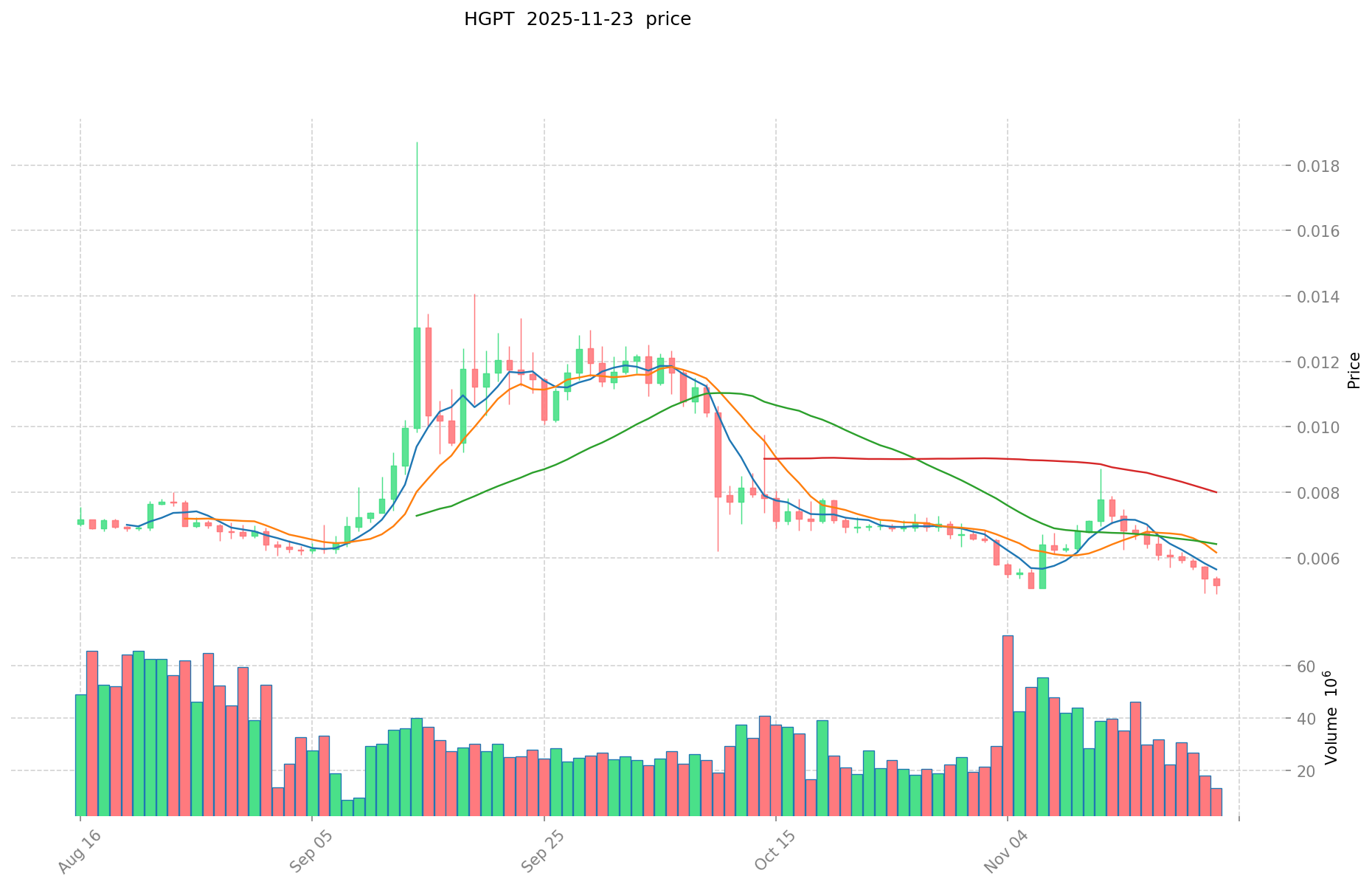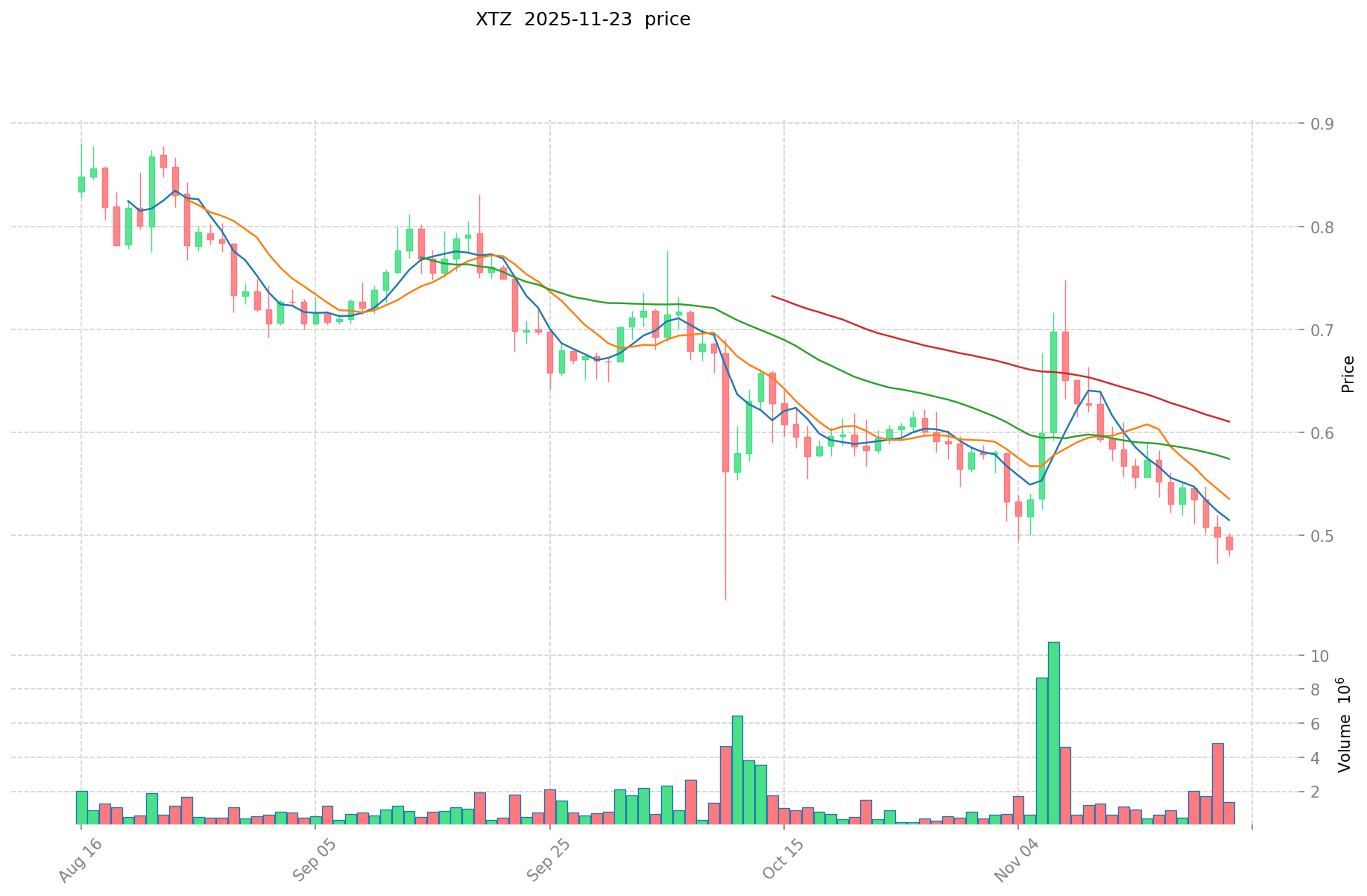HGPT vs XTZ: The Battle of AI Chatbots Reshaping the Future of Conversational Technology
Introduction: HGPT vs XTZ Investment Comparison
In the cryptocurrency market, the comparison between HyperGPT vs Tezos has always been an unavoidable topic for investors. The two not only have significant differences in market cap ranking, application scenarios, and price performance, but also represent different positions in crypto assets.
HyperGPT (HGPT): Since its launch in 2023, it has gained market recognition for its focus on AI solutions for Web3.
Tezos (XTZ): Since its inception in 2017, it has been hailed as a self-evolving blockchain platform, and is one of the cryptocurrencies with significant global trading volume and market capitalization.
This article will comprehensively analyze the investment value comparison between HGPT vs XTZ, focusing on historical price trends, supply mechanisms, institutional adoption, technical ecosystems, and future predictions, attempting to answer the question that investors are most concerned about:
"Which is the better buy right now?"
I. Price History Comparison and Current Market Status
HGPT (Coin A) and XTZ (Coin B) Historical Price Trends
- 2024: HGPT reached its all-time high of $0.10876 on March 29, 2024, followed by a significant decline.
- 2021: XTZ hit its all-time high of $9.12 on October 4, 2021, during the bull market.
- Comparative analysis: Since their respective peaks, HGPT has fallen from $0.10876 to $0.005157, while XTZ has dropped from $9.12 to $0.4865, both experiencing substantial declines.
Current Market Situation (2025-11-23)
- HGPT current price: $0.005157
- XTZ current price: $0.4865
- 24-hour trading volume: HGPT $68,395.46 vs XTZ $674,767.99
- Market Sentiment Index (Fear & Greed Index): 11 (Extreme Fear)
Click to view real-time prices:
- Check HGPT current price Market Price
- Check XTZ current price Market Price


II. Core Factors Affecting Investment Value of HGPT vs XTZ
Supply Mechanisms Comparison (Tokenomics)
- HGPT: Deflationary model with a maximum supply cap, featuring token burning mechanisms
- XTZ: Inflationary model with staking rewards through its liquid proof-of-stake consensus
- 📌 Historical Pattern: Deflationary tokens like HGPT typically show higher price volatility during bull markets, while XTZ's staking rewards provide stability but with potential dilution effects.
Institutional Adoption and Market Applications
- Institutional Holdings: XTZ has attracted more institutional interest through partnerships with financial institutions and its compliance-focused approach
- Enterprise Adoption: XTZ leads in enterprise applications with its formal verification capabilities and strong presence in digital securities
- Regulatory Stance: XTZ benefits from clearer regulatory status in many jurisdictions, while HGPT faces more uncertain regulatory classification
Technical Development and Ecosystem Building
- HGPT Technical Upgrades: Focus on AI integration and decentralized computing capabilities
- XTZ Technical Development: Progressive upgrades through on-chain governance, implementing privacy features and smart contract improvements
- Ecosystem Comparison: XTZ has a more mature ecosystem spanning DeFi, NFTs, and enterprise applications, while HGPT is developing its specialized AI-focused ecosystem
Macroeconomic Factors and Market Cycles
- Inflation Environment Performance: XTZ offers inflation protection through staking rewards, while HGPT's deflationary model theoretically provides scarcity value
- Macroeconomic Monetary Policy: Both tokens show sensitivity to interest rate changes and USD strength, with XTZ exhibiting lower correlation to traditional markets
- Geopolitical Factors: XTZ benefits from its Swiss foundation and regulatory clarity in cross-border transactions
III. 2025-2030 Price Prediction: HGPT vs XTZ
Short-term Prediction (2025)
- HGPT: Conservative $0.00304204 - $0.005156 | Optimistic $0.005156 - $0.00665124
- XTZ: Conservative $0.334788 - $0.4852 | Optimistic $0.4852 - $0.6065
Mid-term Prediction (2027)
- HGPT may enter a growth phase, with prices expected in the range of $0.005249498904 - $0.00967012956
- XTZ may enter a growth phase, with prices expected in the range of $0.3624716925 - $0.9220771125
- Key drivers: Institutional capital inflow, ETF, ecosystem development
Long-term Prediction (2030)
- HGPT: Base scenario $0.011293744313124 - $0.015246554822717 | Optimistic scenario $0.015246554822717+
- XTZ: Base scenario $0.964630971241875 - $1.128618236352993 | Optimistic scenario $1.128618236352993+
Disclaimer: This analysis is based on historical data and market projections. Cryptocurrency markets are highly volatile and unpredictable. This information should not be considered as financial advice. Always conduct your own research before making investment decisions.
HGPT:
| 年份 | 预测最高价 | 预测平均价格 | 预测最低价 | 涨跌幅 |
|---|---|---|---|---|
| 2025 | 0.00665124 | 0.005156 | 0.00304204 | 0 |
| 2026 | 0.0079108508 | 0.00590362 | 0.0037783168 | 14 |
| 2027 | 0.00967012956 | 0.0069072354 | 0.005249498904 | 33 |
| 2028 | 0.0106924003992 | 0.00828868248 | 0.0072111537576 | 60 |
| 2029 | 0.013096947186648 | 0.0094905414396 | 0.007212811494096 | 84 |
| 2030 | 0.015246554822717 | 0.011293744313124 | 0.007905621019186 | 118 |
XTZ:
| 年份 | 预测最高价 | 预测平均价格 | 预测最低价 | 涨跌幅 |
|---|---|---|---|---|
| 2025 | 0.6065 | 0.4852 | 0.334788 | 0 |
| 2026 | 0.7259805 | 0.54585 | 0.3220515 | 12 |
| 2027 | 0.9220771125 | 0.63591525 | 0.3624716925 | 30 |
| 2028 | 0.8023660666875 | 0.77899618125 | 0.7400463721875 | 60 |
| 2029 | 1.138580818515 | 0.79068112396875 | 0.53766316429875 | 62 |
| 2030 | 1.128618236352993 | 0.964630971241875 | 0.520900724470612 | 98 |
IV. Investment Strategy Comparison: HGPT vs XTZ
Long-term vs Short-term Investment Strategies
- HGPT: Suitable for investors focused on AI integration and Web3 potential
- XTZ: Suitable for investors seeking stability and inflation-resistant properties
Risk Management and Asset Allocation
- Conservative investors: HGPT: 20% vs XTZ: 80%
- Aggressive investors: HGPT: 60% vs XTZ: 40%
- Hedging tools: Stablecoin allocation, options, cross-currency portfolios
V. Potential Risk Comparison
Market Risks
- HGPT: Higher volatility due to smaller market cap and newer project status
- XTZ: Susceptible to overall crypto market trends and competitor advancements
Technical Risks
- HGPT: Scalability, network stability
- XTZ: Centralization concerns, potential security vulnerabilities
Regulatory Risks
- Global regulatory policies may have differing impacts on both tokens, with XTZ potentially benefiting from its clearer regulatory status
VI. Conclusion: Which Is the Better Buy?
📌 Investment Value Summary:
- HGPT advantages: AI integration focus, deflationary model, potential for high growth
- XTZ advantages: Established ecosystem, institutional adoption, self-amending protocol
✅ Investment Advice:
- New investors: Consider a higher allocation to XTZ for its established track record and lower volatility
- Experienced investors: Balanced approach with exposure to both HGPT and XTZ, adjusting based on risk tolerance
- Institutional investors: Favor XTZ for its regulatory clarity and enterprise applications, while monitoring HGPT's development in the AI space
⚠️ Risk Warning: The cryptocurrency market is highly volatile. This article does not constitute investment advice. None
VII. FAQ
Q1: What are the main differences between HGPT and XTZ? A: HGPT focuses on AI solutions for Web3 with a deflationary model, while XTZ is a self-evolving blockchain platform with an inflationary model and staking rewards. XTZ has a more established ecosystem and institutional adoption, while HGPT is newer with potential for high growth in the AI space.
Q2: Which token has performed better historically? A: XTZ reached its all-time high of $9.12 in October 2021, while HGPT hit its peak of $0.10876 in March 2024. Both have experienced significant declines since their peaks, with XTZ falling to $0.4865 and HGPT to $0.005157 as of November 2025.
Q3: How do the supply mechanisms of HGPT and XTZ differ? A: HGPT uses a deflationary model with a maximum supply cap and token burning mechanisms. XTZ employs an inflationary model with staking rewards through its liquid proof-of-stake consensus.
Q4: Which token is more suitable for long-term investment? A: XTZ may be more suitable for long-term investors seeking stability and inflation-resistant properties due to its established ecosystem and institutional adoption. HGPT might appeal to those focusing on AI integration and Web3 potential, with higher growth prospects but also higher volatility.
Q5: What are the key risks associated with investing in HGPT and XTZ? A: HGPT faces higher volatility due to its smaller market cap and newer project status, as well as potential scalability and network stability issues. XTZ is susceptible to overall crypto market trends and competitor advancements, with some centralization concerns. Both tokens are subject to regulatory risks, though XTZ may have a slight advantage due to its clearer regulatory status.
Q6: How do institutional adoption and market applications compare between HGPT and XTZ? A: XTZ has attracted more institutional interest through partnerships with financial institutions and its compliance-focused approach. It also leads in enterprise applications with its formal verification capabilities and strong presence in digital securities. HGPT, being newer, is still developing its specialized AI-focused ecosystem.
Share
Content